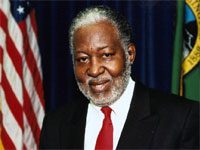

John C. Little, Sr. served the community as a member of the Seattle Board of Park Commissioners from 1990-1997 and was known for his careful consideration of how proposed policies would affect youth. His motto was, “In order to improve the life of all people, you must improve the life of young people.”
John C. Little, Sr. came to Seattle in 1947 from East St. Louis with his wife, Gertis. He went to work for the Seattle Water Department, but his heart always was in creating a better life for the young people of the community. His motto became, “In order to improve the life of all people, you must improve the life of young people.”
John was accorded many honors and awards during his lifetime. He received King County’s first Martin Luther King, Jr. Humanitarian Award; the Washington State University President’s Faculty Award for Community Service; the Salvation Army’s Torchy Award for Service to the Community; the Bishop Foundation Youth Worker of the Year Award; and the City of Seattle Community Service Award. In 1994, he received Safeco’s Rudy Award for dedicated service to the community which included a $30,000 prize that he donated to the Seattle 4-H program.
John C. Little Sr.also served the community as a member of the Washington Human Rights Commission, and as a member of the Seattle Board of Park Commissioners from 1990 – 1997. In addition, John was very involved with his community through his church.
John believed that sports competition offered opportunities for youth development, and noticed that there was lack of such programs in the inner city. He worked with others to create the Central Area Youth Association in the 1960s. Always disguised by the success of its sports leagues, CAYA subsequently expanded its programs with a variety of offerings, including one-on-one tutoring of students and job training.
During the early 1970s Mr. Little, Sr. helped devise a youth conservation corps program in which inner city youth trained and worked in Olympic National Park. Little concluded that he had never seen a program that so profoundly affected the lives of its young participants, and from that day on John C. Little, Sr. searched for opportunities to expose young people to wilderness experiences and challenges.
Although he was supporting a wife and seven children, John returned to the University of Washington and earned a master’s degree from the School of Social Work. He became director of the Mt. Baker Youth Service Bureau, which pioneered a demanding, realistic job training and placement program for inner-city youngsters.
John C. Little, Sr.’s next and final career was as head of the Seattle 4-H program, which falls under the aegis of Washington State University and the King County Extension Program. While 4-H traditionally serviced children from farming communities, Mr. Little created a program to deliver 4-H activities to urban youth, many from minority families, and most from families of limited income. Food preparation, urban gardens, an urban fair, job training, performing arts, and outdoor recreation became the hallmarks of one of the most successful and innovative urban 4-H programs in America. Instead of fields, barns, and farmhouses, the program operated out of P-Patches, backyards, kitchens, community centers, schools, churches, and Seattle Center. Seattle 4-H became one of the nation’s largest and most successful 4-H programs, with an exceptional level of participation from minority communities.
This led to the creation of the remarkable 4-H Challenge Program at Franklin High School. John C. Little, Sr., who lived near the high school, told the coach that his football team had a very serious problem: it didn’t play as a team. In fact, the coach had never had a winning season, and Franklin hadn’t won a football championship in 37 years. Working together, Little and the coach designed a low-cost outward bound-type program. The boys got better acquainted, engaged in team building activities, faced challenges, took risks and set individual and group goals. From a 2-win, 6-loss season in 1985, they won the Metro football championship in 1986-and most years from then until now. The program was then expanded to include more and more of the Franklin student body, including every member of the freshman class. Skills in job development were gradually introduced. School attendance improved, dropout rates declined, discipline was better, and academic performance was enhanced.
In John’s seven years on the Board of Park Commissioners, he will be most remembered for his gentle judgment of how a proposed policy or new undertaking would be perceived by the people we serve, particularly by the young people. His sensitivity to the needs and the attitudes of youth belied his advanced years. If the Board wanted a thoughtful, wise opinion on a subject, it turned to John C. Little, Sr.
John C. Little, Sr. is survived by his wife, Mrs. Gertis Little, daughters Georgetta, Brenda, Sandra, and Yvonne, and sons John Jr., and Gregory, plus 17 grandchildren and 21 great grandchildren. His daughter Patricia passed away in 2012.
John C. Little, Sr. died in the company of his family on May 11, 1999, after a long struggle with diabetes. He was 69. Mr. Little was loved and respected by many, many people. He will truly be missed.
An annual award in his honor recognizes the Seattle Parks and Recreation employee who exemplifies John’s service to youth and community.
Past recipients:
- Willie Rodgers
- Pat Warberg
- Elaine Dunn
- Don Ganchorre
- Dennis Cook, Tom Ostrom, Isiah Anderson, Patti Petesch, Folasa Titialii, Royal-Alley Barnes, Ron Mirabueno, Diane Jones, and Dave Gilbertson